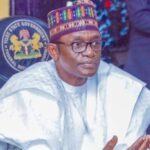
Chekwube O. Danladi is a poet and joint winner of the Brunel University African Poetry Prize. A Nigerian based in the United States of America, she talks about how writing comforted her while growing up there, her win, what informs her writing style and more.
Bookshelf: You write poetry as well as short stories. Do you have a favourite?
Chekwube O. Danladi: I don’t have a favourite between the two, though I’ve been writing poetry longer, while fiction is a relatively new venture for me. I appreciate that each prioritizes different outputs, at least in my mind. Poetry allows for much more intimate explorations, where fiction is my field to be more expansive and imaginative. The best thing though is that I use one field to procrastinate with the other, which is a great way for me to ‘waste time.’
Bookshelf: You recently emerged as joint winner of the Brunel University African Poetry Prize. How did this happen?
Danladi: It’s still a surprise to me. I suppose how it happened is clear enough: the judges made a decision, and I’m lucky that it included me. It’s an honour to be paired with Gbenga, an incredible talent and so sharp.
Bookshelf: What inspired your winning poems?
Danladi: Each of those poems were inspired by various things. I tend not to be reactive in how I’m inspired to write a new poem. I’m not struck out of nowhere, I mean. I walk to a poem rather than run to it. Typically, my emotions and energies collude after some considerable time spent thinking about whatever it is that brings me to a poem. It may be months I spend ruminating over an image or processing an absence and looking at the words that take shape around it.
Bookshelf: Did you specifically write them for the contest? How certain were you of your win?
Danladi: I didn’t. Most of these poems are actually older pieces that I’ve been harbouring for some time. I have much newer poems that didn’t appear in the contest at all. My process is a slow one, so some of those poems were written several months in advance of the deadline, and are at least a year old. I wasn’t at all certain of a win. In fact, I had in my mind an idea of other people who might win. I was really satisfied and resigned to being even waitlisted, considering how impressive a feat even that is. When I found out I won, I was stunned.
Bookshelf: What are you currently working on?
Danladi: A couple of things. I’m actually working on a collection of short stories, and that’s been really exciting and arduous. My priorities are there right now. I’ve been writing poetry pretty consistently, and doing that mostly for my own wellbeing, as poetry has often been for me. I’m not currently making any plans for those poems though, just letting them exist and working to polish them.
Bookshelf: What informs your writing style and the themes you explore?
Danladi: I’m never really sure how to answer this question. I guess I’m still forming a sense of what my style is and looks like from my subjective position. I’m often inspired simply by the lives around me and how I enter or exit them. I’m interested in quotidian historiographies, and in trying to cope and understand with absences. Much of my work is inspired by loss and mourning. I also toy with language frequently, as someone who was a native Hausa speaker, but with time and distance, has been losing that tongue. Growing up bilingual gave me access to a host of alternative ways of imagining and describing, and it’s become a sort of major theme of exploration for me.
Bookshelf: How did you start writing?
Danladi: I don’t know if I can pinpoint an exact spot, but I do recognize that writing has been a part of my life for a very long time. I was always an avid reader as a child, and at some point I must have recognized the additional desire to not only enter new worlds but attempt to create them. As a child I wrote all sorts of things: Fake news reports to explain what I encountered in any given day, all sort of trite poems, and underdeveloped short stories. My hope, of course, is that as I’m getting older, I’m getting better at these types of things. But even then, writing was encouraged as a means of expression, especially because I was very quiet and oftentimes didn’t speak, to the point where some teachers believed I had a speech impediment. Particularly as an immigrant child, writing was my source of comfort as I struggled to make sense of the chaos around me. The first time I decided I wanted to try my hand at writing seriously, that is, actually paying attention to form and function, was probably when I was an undergraduate. I took a seminar where I read Buchi Emecheta’s ‘The Bride Price’ and I was enthralled. It was the first time I had read anything by a Nigerian woman writing of that time (pre-Adichie and the like), and I was thrilled to see that persistence of our voices. When I finished that book, I told myself that I should try to no longer prevent myself from moving forward with a ‘writerly’ initiative.
Bookshelf: You were born and bred in Lagos before relocating to the United States. How has this movement impacted on your writing?
Danladi: It’s been central to my work in that it enacted a bifurcation of identity that is now definitive for me. I am not who I am without my immigrant and bicultural black identity informing everything I do. Liminality is a notion I grapple with constantly in my poetics and in my fiction, but it isn’t the totalizing telos of my work either. I do still write about Nigeria as well as the United States, and I feel comfortable with the back and forth this requires. It requires me to be adept at enabling a different voice for different localities, which is a lot of fun.
Bookshelf: Your name indicates both Igbo and Hausa lineage. Where are you from?
Danladi: I always get this question. Indeed, I have both Igbo and Hausa lineage. My mother is of Hausa-Fulani heritage from Plateau and Kaduna states, while my father was an Igbo man from Onitsha, Anambra State. I was born in Lagos, but have also lived in Kaduna and Port Harcourt. I like to indicate this double lineage, as it tends to surprise most Nigerians to hear that at some point, even briefly, a Northerner and a Southerner came together.



